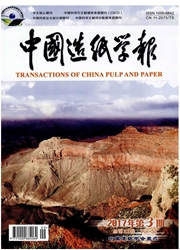

 中文摘要:
中文摘要:
对厚度为80μm的人工林杉木弦切片进行纵向零距抗张强度测试,以此快速评价管胞的抗张强度,重点探讨了管胞纵向抗张强度的一些重要影响因子。研究结果表明,S2层微纤丝角对管胞的抗张强度有着显著影响,微纤丝角越小,管胞的抗张强度越大;含水率对管胞的抗张强度影响不显著;纤维素的聚合度小于757时与管胞的抗张强度存在正相关关系,但当聚合度大于757后对管胞的抗张强度没有显著影响;过度脱木素会削弱细胞壁内基质对微纤丝的应力传递作用,限制纤维素承载潜力的发挥,从而显著降低管胞的纵向抗张强度。
 英文摘要:
英文摘要:
Zero-span tension of wood microtome sections with 80μm in thickness was conducted to investigate the factors affecting longitudinal tensile strength of tracheids of Chinese Fir plantation wood. It was found that there exists a significant negative correlation between microfibril angle (MFA) of S2 layer and tensile strength of tracheids, the moisture content has insignificant effect on the tensile strength of tracheids with a little decrease of 1.5 %-10 % when moisture content increases from 8 %-9 % e to water saturation. There exists positive correlation between degree of polymerization (DP) of cellulose and tensile strength of tracheids when DP is less than 757, but above which DP has little impact on the tensile strength of tracheids. Serious delignification will weaken the stress transfer between lignin-hemicellulose matrix and cellulose microfibrils, and results in significant reduction of loading capacity oftrachedis.
 同期刊论文项目
同期刊论文项目
 同项目期刊论文
同项目期刊论文
 期刊信息
期刊信息
